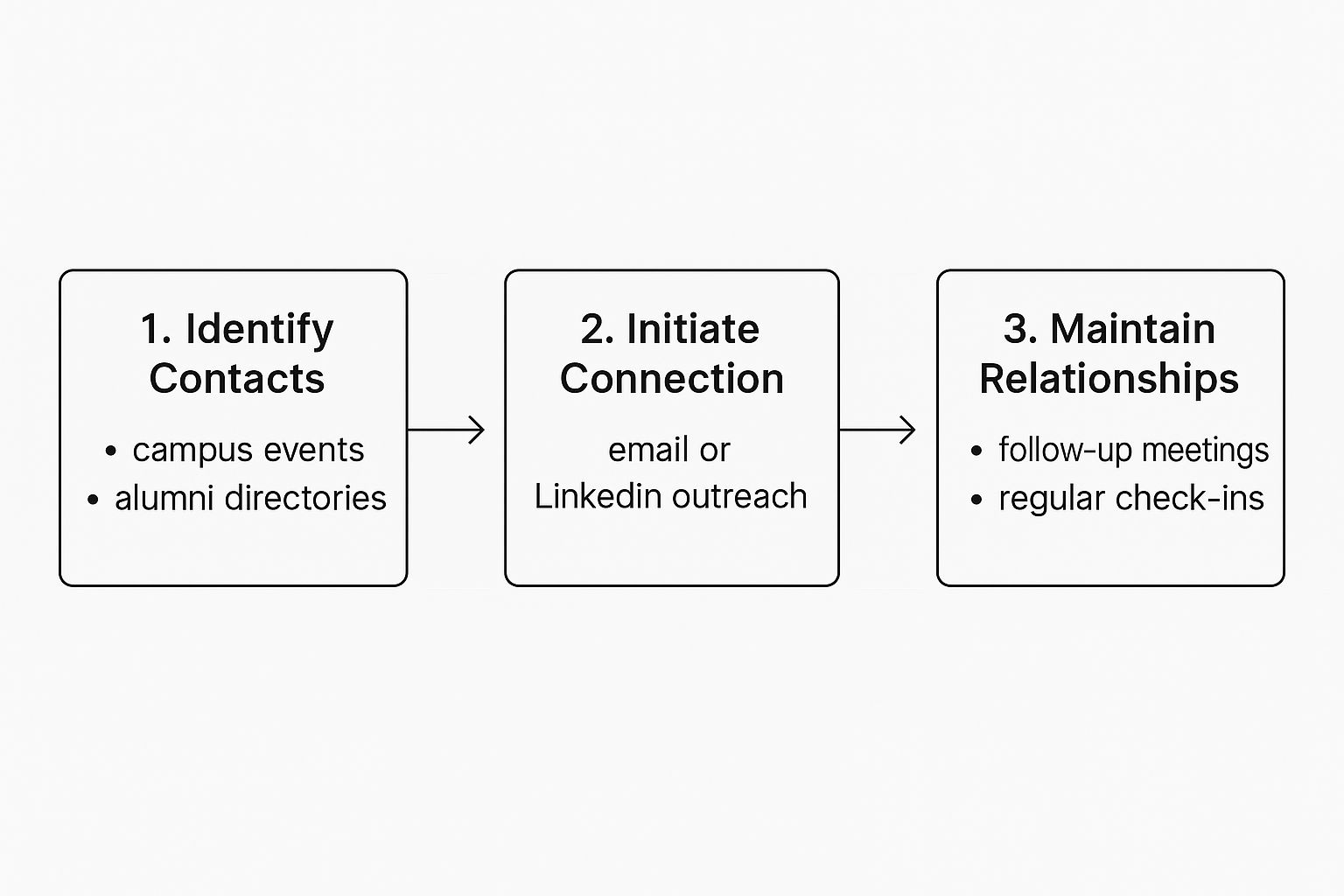Figuring out your career can feel like a massive, terrifying question mark hanging over your head. But what if you saw your college years not just as a path to a degree, but as the perfect time to build a future you're genuinely excited about?
This isn't about adding another stressful to-do list to your already packed schedule. Think of it as a roadmap for turning self-discovery into a clear, actionable career direction—one step at a time.
Why Your Future Starts Now, Not After Graduation

The pressure to have it all figured out is real. It's a huge mental health challenge for a lot of students, often leading to that dreaded feeling of being stuck or just putting it off entirely. But starting the process now transforms that anxiety into manageable steps, giving you a sense of control and a reason to be motivated.
The New Reality of the Job Market
Let's be honest: the professional world is more competitive than ever. Waiting until senior year to even think about a job just doesn’t cut it anymore.
A recent Handshake survey really drove this home, revealing that 57% of upcoming graduates have low expectations for their job prospects. That number tells us loud and clear that students need to be strategic and adaptable from day one. You can read the full student success report here to get the whole picture.
This is where a thoughtful approach to your career becomes your biggest advantage. It helps you:
- Connect what you love with what employers actually need.
- Get past the "what if" anxiety by having a clear direction.
- Build practical, hireable skills long before you graduate.
- Walk into the professional world with confidence, not confusion.
A quick note for parents: Your role here is crucial, but it's shifted from director to coach. Instead of asking, "What do you want to be?" try a different question: "What problems do you enjoy solving?" This simple switch encourages exploration and takes the pressure off.
Think of this guide as your personal playbook. We're going to break down everything from uncovering your unique strengths to building a plan you can actually execute. Your future doesn’t begin the day you get your diploma—it starts with the small, intentional decisions you make today.
Start by Understanding Who You Are
Before you even think about majors, internships, or job titles, the real work of career planning starts with one thing: you. You have to get honest about what actually drives you. This isn't about taking some generic personality quiz online. It's about digging deeper to figure out what genuinely gets you excited.
Think about it for a second. When do you get so absorbed in something that you completely lose track of time? What kinds of problems do you find yourself thinking about, even when no one is asking you to? Those are the breadcrumbs that lead to a career that feels right, not just one that pays the bills.
Why Procrastination Is a Red Flag
We’ve all been there—staring at a project we just can’t bring ourselves to start. It’s easy to write it off as laziness, but more often than not, procrastination is a signal. It’s your brain’s way of saying, “Hey, this isn’t clicking with me.”
Forcing yourself to grind through a class or a task might get you a passing grade, but it’s a fast track to burnout. The goal isn’t to find a career you have to constantly push yourself through. It’s to find one that pulls you in. This is huge for your mental health, because trying to force a fit in a career that clashes with who you are is a major source of stress and anxiety.
Parenting Tip: Instead of focusing on your student's procrastination, get curious about what's underneath it. Ask open-ended questions like, "What part of this project feels like the biggest hurdle?" or "Is there anything about this topic that genuinely interests you?" This turns a potential argument into a collaborative conversation.
Building Your Personal Compass
To make smart career moves, you need a guide. Think of it as your "Personal Compass"—a simple framework that maps out your unique strengths, interests, and non-negotiable values. This compass acts as a filter, helping you sort through opportunities and confidently say "no" to the ones that aren't a good fit.
Here’s how to start building yours:
- Identify Your Strengths: What do people always compliment you on? Maybe you're a natural organizer, a creative problem-solver, or the person everyone turns to for a listening ear. Jot down at least five things you’re good at, no matter how small they seem.
- Explore Your Interests: Forget about what you should be doing. What topics do you find yourself reading about just for fun? If you had a completely free Saturday with no obligations, how would you spend it? Your hobbies and curiosities are powerful clues.
- Define Your Values: This is the most important piece of the puzzle. What matters most to you? Is it financial security, creative freedom, helping others, or constant learning? Getting clear on your core principles is essential. For more help with this, check out our article on personalizing your values and building a life brand.
To help you organize your thoughts, I've put together a simple framework. Use this table to map out your insights and start seeing the patterns emerge.
Self-Assessment Framework for Career Clarity
Use this table to organize your thoughts and identify patterns in your strengths, interests, and values.
| Assessment Area | Guiding Questions | Your Personal Insights (Example) |
|---|---|---|
| Strengths | What skills come naturally to me? What do others say I'm good at? When do I feel most competent and effective? | "I'm great at breaking down complex projects into small, manageable steps. Friends always ask me to plan our group trips." |
| Interests | What topics do I explore in my free time? What activities make me lose track of time? If I could learn anything, what would it be? | "I spend hours watching documentaries about sustainable architecture and urban planning. I also love hiking and being outdoors." |
| Values | What principles are non-negotiable for me? What kind of impact do I want to make? What work environment would help me thrive? | "I need to feel like my work contributes to something positive. I value collaboration over competition and need a good work-life balance." |
Writing this all down creates a powerful reference point. The next time you're facing a tough decision about an internship, a major, or a job offer, you can pull out your compass and ask, "Does this actually align with who I am and what I want?" This self-awareness is the foundation of every confident career move you'll make from here on out.
Connect Your Major to Real-World Opportunities

Let’s get one thing straight: your degree is a starting point, not a life sentence. An English major can become a top-tier UX writer. That psychology student might thrive in market research. A history buff? They could be the perfect fit for a career in public policy analysis.
It's time to put on your detective hat and uncover the incredible range of paths your education actually opens up.
This exploration isn't just about finding a job; it’s a huge win for your mental health. Feeling overwhelmed by the future often comes from a simple lack of information, which leads straight to procrastination and anxiety. When you actively research what's out there, you replace that uncertainty with real, concrete options. That shift alone builds motivation and gives you a sense of control over your own journey.
Become a Career Detective
Start with the tools right at your fingertips. Your university's career center isn’t just for polishing your resume; they have alumni databases and industry connections that are pure gold. Use them. Find people who graduated with your major and see where they are now.
LinkedIn is another powerhouse. Search for professionals with your degree and look at their job titles. Pay close attention to how their careers progressed and what skills they highlight on their profiles. This is real-world data, and it's far more useful than generic career advice.
Parenting Tip: Support your student's exploration without piling on the pressure. Instead of asking, "Have you found a job yet?" try, "Tell me about one interesting person you found on LinkedIn this week." This keeps the conversation focused on learning and curiosity, not just outcomes.
Decode Job Descriptions and Find Your Fit
Once you’ve spotted a few interesting roles, it’s time to analyze actual job descriptions on sites like Indeed or LinkedIn. This is where you connect the dots between your academic knowledge and what employers are actively looking for.
Look for patterns in the requirements. Do a lot of these roles ask for specific software skills, project management experience, or killer communication abilities? This analysis is your roadmap—it shows you exactly where your skill gaps are so you can start filling them with coursework, certifications, or extracurriculars.
- Try Informational Interviews: Reach out to one or two people in roles that interest you and ask for a quick, 15-minute chat. Ask them what they love about their job and what the biggest challenges are.
- Look for Growing Sectors: Pay attention to industries that are expanding. A quick search for "fastest-growing job sectors" can point you toward opportunities you never even considered.
- Create a Shortlist: Your goal here is to identify 3-5 potential career paths that genuinely excite you based on solid research.
Tackle the Internship Dilemma Strategically
Internships can be fantastic, but they aren't a magic ticket to a job offer. A recent BestColleges report found that while about 40% of students land internships, these experiences led to a job for less than 10% of recent graduates.
The data is telling us something important: just having an internship isn’t enough. You can read more about graduate job prospect findings to get the full picture, but the takeaway is that its value comes from being strategic.
Instead of just collecting internships for your resume, focus on quality. Hunt for experiences—paid or unpaid—that let you build specific, in-demand skills and contribute to meaningful projects. A part-time job, a significant volunteer role, or a leadership position in a campus club can be just as valuable, if not more so, when it directly helps you build the skills for the career you actually want.
Build Skills That Employers Actually Want

Knowing where you want to go is the first step. Having the actual tools to get there is a whole different ballgame.
This is the part where you start bridging the gap between what you know and what gets you hired. It’s about creating a personal growth plan filled with small, tangible goals that build momentum over time. Small wins are everything.
And remember, valuable experience isn’t just about landing a formal internship. It’s about proactively creating your own opportunities to learn, grow, and show employers what you’re made of.
Go Beyond Your Coursework
Your classes give you a solid foundation, but employers are really looking for skills you can put to use on day one. Think of your time in college as a sandbox—a place to experiment, fail, and build up your professional toolkit.
So, how do you do that?
- Volunteer for a cause you actually care about. This shows commitment and often gives you a chance to take on responsibilities you’d never get in a typical entry-level job.
- Take a leadership role in a campus club. Managing a budget, organizing an event, or leading a team are powerful, tangible experiences you can put right on your resume.
- Find a relevant part-time job. Seriously, even a customer service role is gold. It teaches you crucial skills in communication, problem-solving, and handling tough situations.
Parenting Tip: Encourage your student to explore these non-academic paths without piling on more pressure. Frame it as "skill-building," not just resume-padding. Ask open-ended questions like, "What was the biggest thing you learned from organizing that fundraiser?" This helps them connect their real-world experience to their future career goals.
Overcoming Motivation Hurdles and Procrastination
Look, building new skills takes real effort, and it’s completely normal to procrastinate when you feel overwhelmed. This is usually a sign that your goals are too vague or you’re afraid you aren't good enough. In fact, research from the American Psychological Association found that anxiety is a major factor in academic procrastination for over 80% of college students.
The best way to fight this is to break your goals down into ridiculously small steps. Instead of a huge, intimidating goal like "Learn Python," start with "Watch one 20-minute Python tutorial." This simple shift creates small, achievable wins that fuel your motivation.
Developing professional skills is a marathon, not a sprint. This process is a huge part of effective career planning for college students because it builds both competence and resilience. For more on that, our article on building resilience and the power of grit offers some really practical strategies.
Don't be afraid to lean on outside resources, either. The Jed Foundation offers fantastic mental health resources for teens and young adults that can help you manage the stress that comes with juggling academics and career pressures.
Create Your Personal Career Action Plan
Okay, you've done the deep work of self-discovery and researched your options. Now it's time to pull it all together into something you can actually use—a personal career action plan.
Think of this as your roadmap for the next year. It’s not a rigid contract you're locked into forever; it's a living, breathing guide that details the real, tangible steps you'll take. Its whole purpose is to keep you focused and moving forward.
The best way to build this is with SMART goals—Specific, Measurable, Achievable, Relevant, and Time-bound. This simple framework is what turns a vague wish like "I need to network more" into a clear target like "I will attend two campus career fairs this semester and connect with three new people on LinkedIn each month." For a deeper dive, check out our guide on goal setting for teenagers.
This visual breaks down a simple, effective networking strategy into three clear steps. It’s a great way to see how this works in practice.

The key takeaway here is that networking isn't a one-and-done task. It’s a continuous cycle of identifying people, making genuine connections, and maintaining those relationships over time.
Don't Forget to Prioritize Your Well-Being
Career planning can get intense. It's way too easy to get swept up in the pressure to have everything figured out perfectly. This is where your plan needs a non-negotiable section: your mental health. Burnout is a very real threat, and ignoring it is the fastest way to derail your motivation.
Your action plan has to make space for self-care. Actually schedule time for things that recharge you, whether that's hitting the gym, hanging out with friends, or just unplugging completely for an evening. Your ability to succeed is directly tied to your well-being. If you need support, The Trevor Project provides free, confidential mental health resources built for young adults navigating these exact kinds of stressful transitions.
Integrating personal wellness into your career strategy isn't a luxury—it's essential. A sustainable plan has to account for both your professional ambitions and your personal needs.
This isn't just a nice idea; it's what students are demanding. Recent data from Inside Higher Ed shows a huge shift in priorities. 79% of students now see health benefits as a critical job component, and 73% prioritize being located near family. For those who do relocate, 90% cite the cost of living as a major stressor. It’s clear: a good plan has to balance career goals with personal and financial stability. You can discover more insights about graduate readiness in the full report.
A Guide for Supportive Parents
Parents, this is where you step in as a coach, not a director. Your student is already juggling enough pressure. Your role is to be a source of encouragement.
Here’s how you can help:
- Focus on the process, not just the final outcome. Celebrate the small wins, like a great cover letter draft or a productive informational interview.
- Be a sounding board, not a problem-solver. Listen to their ideas and worries without immediately trying to fix everything. Ask questions like, "What's one small thing you could do about that this week?"
- Validate the stress. Let them know you see how hard this is. A simple, "I can see you're working really hard on this, and it's a lot to manage," goes a long way.
When you foster a supportive environment, you’re helping them build a journey that’s not just successful, but healthy, too.
A Few Common Questions About Career Planning
It’s completely normal to have a ton of questions when you’re trying to figure out the whole college-to-career thing. The path forward can feel a bit foggy, and that’s okay. Let’s tackle some of the biggest concerns I hear from students (and their parents) to help clear things up.
"What If I Have Absolutely No Idea What I Want To Do?"
First off, take a breath. You are not alone. Not even close. Feeling like you need to have your entire life mapped out by sophomore year is a huge source of anxiety for so many students. It’s also the #1 reason people procrastinate on this stuff.
The goal right now isn’t to find the perfect, lifelong career. It’s simply to start exploring.
Think of it like a research project, but the subject is you. Start with the self-assessment exercises from earlier in this guide—they’re your foundational clues. Then, turn your focus outward:
- Talk to people. Seriously. Find folks on LinkedIn or through your college's alumni network who have interesting job titles and ask for 15 minutes of their time. Most people are surprisingly happy to share their story. These are called informational interviews, and they are gold.
- Use your campus resources. Your school has career counselors who are literally trained for this exact situation. They have tools and frameworks to help you connect the dots you can’t see yet.
Every conversation you have and every article you read is another piece of the puzzle. Just focus on collecting clues.
"How Can Parents Best Support Their Teen's Career Journey?"
This is a big one. As a parent, your instinct is to help, to provide answers, to fix it. But the most powerful thing you can do is shift from being a manager to being a supportive coach.
Your teen is already swimming in pressure—from school, from their friends, and especially from themselves. Adding your own pressure to the mix, even with the best intentions, usually just backfires and creates tension.
Instead of pushing for a decision, work on creating an open dialogue.
Parenting Tip: Try shifting your questions from focusing on the outcome to focusing on the process. Instead of, "Have you picked a major yet?" ask, "What was the most interesting thing you learned in your classes this week?" This opens the door for conversation without judgment.
Remember, a teenager’s motivation is tied directly to their sense of autonomy. When you support their exploration—even if it’s a path you wouldn’t have picked for them—you’re showing you trust them. That trust is what builds their confidence. For more great insights, organizations like the Child Mind Institute offer fantastic resources on fostering resilience in teens.
"How Do I Overcome Procrastination and Stay Motivated?"
Let’s get one thing straight: procrastination isn't a character flaw. It’s a natural response to feeling overwhelmed. When a goal like "figure out my career" feels huge and undefined, of course you’re going to avoid it.
The secret is to break it down into ridiculously small, non-intimidating steps. Forget the giant goal for a minute.
Instead, just focus on one tiny thing at a time:
- This week: Spend 30 minutes just cleaning up your LinkedIn profile. That’s it.
- Next week: Find one company that seems cool and spend 20 minutes on their website.
- The week after: Send one email to an alum asking for a brief chat.
Each time you check one of these tiny tasks off the list, you get a little hit of dopamine. That small win builds momentum, making the next step feel that much easier. This approach to career planning for college students transforms a scary obligation into a series of achievable wins. It’s a game-changer for your motivation and your mental health.
Feeling stuck is a sign that it's time to get support, not a reason to quit. At Andrew Petrillo Life Coaching, I work one-on-one with students and young adults to cut through the noise. We build practical strategies to beat procrastination, manage stress, and create a clear, actionable plan that actually feels exciting.
Book a free discovery call, and let’s talk about how we can turn that uncertainty into confidence. Find out more at https://andrewpetrillolifecoaching.com.



















